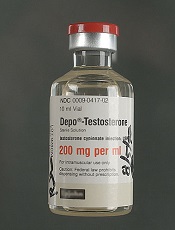
(Depo-Testosterone)
Starting testosterone treatment is associated with an increased risk of venous thromboembolism (VTE) that peaks within 6 months and declines thereafter, according to research published in The BMJ.
Previous studies have reported contradictory results regarding testosterone use and VTE.
Researchers involved in the current study believe that failure to investigate the timing and duration of testosterone use may explain the conflicting findings.
For this study, David Handelsman, MBBS, PhD, of the University of Sydney in New South Wales, Australia, and his colleagues set out to determine the risk of VTE associated with use of testosterone treatment in men, focusing particularly on the timing of the risk.
The study involved data from 19,215 patients with confirmed VTE and 909,530 age-matched controls registered with the UK Clinical Practice Research Database between January 2001 and May 2013.
The researchers divided subjects into 3 mutually exclusive testosterone exposure groups: current treatment, recent treatment, and no treatment in the previous 2 years. The “current treatment” group was subdivided into durations of more or less than 6 months.
After adjusting for confounding factors, the researchers estimated rates of VTE.
The adjusted rate ratio of VTE was 1.25 for current testosterone treatment as compared to no testosterone treatment.
In the first 6 months of treatment, the rate ratio of VTE was 1.63, which corresponded to 10 additional cases of VTE above the base rate of 15.8 per 10,000 person-years.
The risk of VTE declined after more than 6 months of treatment and after treatment stopped. The rate ratio after more than 6 months of treatment was 1.00. After treatment stopped, the rate ratio was 0.68.
The researchers noted that this is an observational study, so no firm conclusions can be drawn about cause and effect. The team also stressed that the increased risks observed are temporary and still relatively low in absolute terms.
Nevertheless, they said their study suggests “a transient increase in the risk of venous thromboembolism that peaks during the first 3 to 6 months and declines gradually thereafter.”
The team said additional research is needed to confirm the temporal increase in the risk of VTE they observed as well as the absence of risk with long-term testosterone use.


